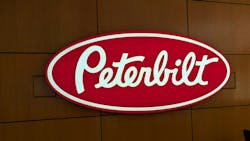DENTON, Texas—Peterbilt has been in business for 120 years. The company's new general manager, Jacob Montero, noted in this span the truck maker has seen 21 presidents, 29 election cycles, and multiple technology transitions. From the 1970s, Peterbilt has also had to adjust to more than 33 different federal emissions and fuel standards.
"Regulatory change is part of what we do,” offered Montero, who took the role in January.
This year, though, it's not emissions regulations that the trucking industry must worry about, due to President Trump's more pro-business stance. It's a swiftly evolving economic environment, shaken up by a series of tariff policy changes that threaten stability for the manufacturer and its customers dependent on strong freight demand.
Peterbilt, though, has also weathered the Great Depression, and other significinat downturns in the early '70s and '90s, as well as the Great Recession of the late 2000s, and most recently, the COVID pandemic.
To get through this latest economic setback, Montero, who met with the media in mid-April at the company headquarters in Denton, is relying on a flexible outlook and partnerships to handle the curve balls that come his way. He said the focus will be on working with customers to meet their needs with Peterbilt products, developing manufacturing in the U.S. and abroad, and preparing for a flexible manufacturing strategy.
“It’s a partnership, right?” Montero said during a roundtable Q&A with Peterbilt’s new executive leadership team on April 13. “You can’t predict the future, but we can stay very close with [customers] and advise them and try to assist them as they look and set their purchase plans over the next few years... It’s a unique time in our industry because of regulation uncertainty, things that you’re hearing out of the White House. But we’ll just stay close to [our customers] and see where it evolves.”
Parent company Paccar has invested billions of dollars into Peterbilt's product lineup, which includes over-the-road tractors, heavy- and medium-duty vocational trucks, and various work trucks.
This includes the new Model 589, which replaced the Model 389 last year. So far, Peterbilt has produced 6,000 of the long-nosed semis, which retain several classic elements truckers have come to love. Meanwhile, sibling company Kenworth is sunsetting its legacy W900 after a final 1,000-unit production run in 2026.
And though Trump has relaxed emissions tension, Peterbilt continues to evolve and expand its near-zero and zero-emission portfilio of natural gas and battery-electric trucks.
Mitesh Naik, Peterbilt’s product planning and strategy director, said Peterbilt has “the broadest product lineup” in the industry. “From a customer perspective, our partners should feel really good about that,” he added.
Currently, the company has a 21.2% market share in vocational and refuse market share and its Class 8 sales reached 15.7%, according to American Truck Dealer data.
This diversity in product lineup is mirrored in its manufacturing strategy, which Montero said will help it respond to situations such as Trump’s tariffs.
“Paccar has a flexible manufacturing strategy,” he noted. “We build in all three countries. We build in Mexico, we build here in the United States, we build in Canada, and we have the flexibility for those factories. But I’ll tell you, it’s been changing so rapidly, it’s just too early to comment because of that.”
Also adding to the uncertainty is how the current administration will impact emissions regulations.
ACT President Ken Vieth recently told FleetOwner that “Trump’s policies have introduced considerable risk and uncertainty into business planning.”
Vieth added that along with economic uncertainty driving down truck sales in 2025, “we add regulatory uncertainty, especially in regard to the EPA’s low-NOx, Clean Truck regulation.” ACT had also dropped its 2025 Class 8 sales forecast from 289,000 to 255,100 units based on a weak Q1 and anemic MY2027 pre-buy environment.
That's because the industry still doesn't have a good read on what will happen with the EPA's 2027 NOx rules. Longer term GHG rules have already been rolled back as part of Trump's campaign promise to "end EV mandates."
Montero noted all of this leads to “lots of uncertainty right now in the regulatory front, but we’re prepared if it happens. Just need to see how the second half of the year works out.”
For fleets, he advised taking the same level-headed approach and not make any rash decisions.
“There’s no wait-for-next-year approach," he said. "I think most fleets have a cycle they need to manage. They have a fleet age they need to manage. They always need to be replacing trucks … We’ve dealt with regulatory changes before, and each fleet has their own perspective of how they look at it. But I don’t really see too much changing right now.”
A version of this article originally appeared on FleetOwner.com.
About the Author
Josh Fisher
Technology Editor
Editor-in-Chief Josh Fisher has been with FleetOwner since 2017. He covers everything from modern fleet management to operational efficiency, artificial intelligence, autonomous trucking, alternative fuels and powertrains, regulations, and emerging transportation technology. Based in Maryland, he writes the Lane Shift Ahead column about the changing North American transportation landscape.

